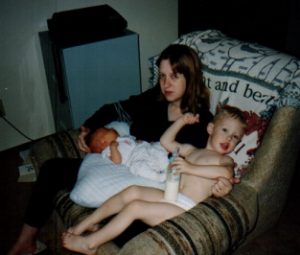by Jennifer Quist. Reposted by permission.

Enough people have asked how I managed to write two novels while at home with my kids that I thought I’d better craft an answer a little more thoughtful than “by being a crap mother.” Here it is, some very honest and probably very bad advice on how to launch a writing career while masterminding a large, young household.
- Stop cleaning the house. This is done by a) quitting once conditions become sanitary without proceeding all the way to spiffy and, b) looking at your children the way our great-grandmother’s (and my parents) looked at their children: as a private workforce, a domestic militia of barely competent workers. Assigning one light chore every day and one heavier cleaning task on the weekend should do it.
- Start mowing the lawn. Look, you’re not going away on writers’ retreats to the Banff Centre any time soon. That’s not the life you chose. But you do need to spend time alone with your thoughts en plein air, and pushing a machine that drives conversation away all around the backyard is better than nothing.
- Stay up. My creativity comes in all-or-nothing surges. During a surge, I tend to get about four hours of sleep during the night, maybe less. This isn’t a desperate attempt to make the most of the hours when my house is quiet (though it has that benefit). There’s simply more energy in my mind when I’m creative and it keeps me sleepless for weeks on end. Don’t resist it just because your family needs to get up in the morning. Squeeze a ten minute nap or two into the daylight hours even if it means taking the bus and sleeping away the commute (trust me, most of my university’s student population does this, even the sleep-drooler population). Staying up to write won’t be your lifestyle forever. Think of it as a grueling but temporary training regimen, like going for long, long runs leading up to a marathon.
- Keep reading. I was badly stuck during the writing of my current novel. There was a difficult decision to be made, I didn’t have the confidence to make it, but until I did, the book couldn’t move forward. The solution was to stop writing for the rest of the day and read some excellent writing that succeeds in doing the very thing I was afraid to attempt. I opened a collection of short stories by Mavis Gallant, read until 1am, and went to bed stoked to take the risk I needed.
- Don’t spend too long lying around miserable about not being Mavis Gallant. This was an unintended side-effect of reading good writing. It’s inevitable and understandable, just don’t let it go on for too long.
- Talk to your partner about your book. His input may not make it into the manuscript but airing your story’s sticking points out loud with an attentive adult who wants you cute and happy is a helpful exercise. It also downplays any burgeoning sense of resentment he may have for a) the project that consumes so much of your attention, and b) the way you hog the lawnmower.
- Share with care. I don’t mean to say you should make your partner to read half-baked early drafts. Don’t do this to your loved ones. They often don’t know what to say and it puts them in an awful position. Instead, use a professional writer-in-residence based in your local library, university, or other arty institutions. These real, working writers are waiting to read fifteen pages or so of your writing and give an impartial, informed assessment of how you’re doing and how it could be better. Their services are free and competition for their positions is fierce so you can usually trust they’ve been well-screened for things like being a jerk. But having said all this, if someone asks you to read their work, do it. You can take a lesson from the writers-in-residence and limit the amount of pages you’ll read, but say yes. Strictly speaking, I don’t believe in Karma but I make a cautious exception when it comes to lending my pickup truck and to helping other writers.
- Distract. If you have kids at home during the day, introduce them to pastimes they can do by themselves in the same room as you while you sit still and say very little—things other than screen-time, which won’t make anyone happy in the long run. What could those pastimes be? It depends on the kid. For some kids, nothing will fill this bill and you’ll just have to let them trash your house while you get some work done, or learn to type with their heads wedged into the triangle formed by the crook of your arm and the edge of your desk (been there). If they are willing to give you a break, get them some Lego, craft supplies, Play-Doh, a load of siblings, a bunch of ironing to do—anything.
- Be honest with yourself about other interests competing for discretionary time. If you can’t give up crafting, cake decorating, direct marketing essential oils, etc. in order to make time to write consistently, it might be best to wait until you are willing to make writing a priority. There’s nothing wrong with other pursuits, we just need to be realistic and at peace with how we choose to spend our time.
- Don’t call your writing a hobby if you’re doing it as a serious artistic project. Don’t let anyone call it a hobby.
- Go easy on people. People are who you are writing for. Don’t tell me it’s all for yourself, forever and ever. That might be how things turn out but that’s not the goal you have in your heart. Spending time with your kids, your partner, your extended family, friends, colleagues, strangers is part of writing. Nothing is more inspiring than life going on around you. This is an advantage mothers surrounded by people have over other writers. When I was working as a columnist for a newspaper in Fort McMurray staffed mostly by young, single newcomers to the city, a pattern emerged when these people would try to write columns of their own. They’d write a few articles on food they ate or television they watched and then their columns would usually fizzle. What they lacked wasn’t talent or voice or experience, it was other people. They were isolated, lonely, and in many ways creatively bereft. You and I, we are none of those things.
And that is the awful truth of how I do it.
 Jennifer Quist is the author of two novels: Love Letters of the Angels of Death and Sistering. Love Letters of the Angels of Death is neither a romance nor a horror story — just flamboyantly titled literary fiction. Whereas Love Letters… is a strangely light-hearted tragedy, Sistering is a strangely dark-hearted comedy. Both are published by Montreal literary press, Linda Leith Publishing. Love Letters… was long-listed for the 2015 International IMPAC Dublin Literary Award. On the merits of the book, Jennifer won a Lieutenant Governor of Alberta’s Emerging Artist Award in 2014. Earlier that year, the book was a finalist for a Whitney Award. Sistering won Best Novel in the 2015 Association for Mormon Letters Literary Awards, was long-listed for the Alberta Readers’ Choice Award, and was named a “Must-Read” of the 2015 fall season by CBC Books.
Jennifer Quist is the author of two novels: Love Letters of the Angels of Death and Sistering. Love Letters of the Angels of Death is neither a romance nor a horror story — just flamboyantly titled literary fiction. Whereas Love Letters… is a strangely light-hearted tragedy, Sistering is a strangely dark-hearted comedy. Both are published by Montreal literary press, Linda Leith Publishing. Love Letters… was long-listed for the 2015 International IMPAC Dublin Literary Award. On the merits of the book, Jennifer won a Lieutenant Governor of Alberta’s Emerging Artist Award in 2014. Earlier that year, the book was a finalist for a Whitney Award. Sistering won Best Novel in the 2015 Association for Mormon Letters Literary Awards, was long-listed for the Alberta Readers’ Choice Award, and was named a “Must-Read” of the 2015 fall season by CBC Books.

Thank you for sharing, Jennifer! These ideas are great. I do think about writing while mowing the lawn too. It’s all about stealing time.
So many of these points resonate with me. Half of the battle of writing, I think, is just figuring out the tricks to get yourself to do it. The other half is the writing itself. The third half is then finding ways to get your work in front of people. Wait, I think I’ve just demonstrated why I’m an English major…
Can I point my MIL to this as to why my house is perpetually messy? 😉 I live getting glimpses into other people’s schedules. If any function on little sleep, so my writing time has to be methodical.
*I can’t function . . .
When I was a young mom I could always find time to write. Now I’m a mom of teenagers and I can’t even seem to find time to THINK about writing. I know this is in part because I got a job as a copy writer, so I’m finally getting paid to write something, but not to write fiction, which is what I really want to write. I know, I just have to prioritize and cut back on some of that other stuff I like to do for a while to finally get that next book finished. What I love about writing is that I can set it aside for a few months or a few years, and it is always there waiting for me when I come back, like a favorite aunt who is always delighted by an extended visit from her favorite niece.
I like this comparison to a favorite aunt. And yeah, one of the advantages as well as frustrations of writing is that you can put it down and then take it back up again, although I do find that when I’ve taken a while not-writing it can take a while to get back into the mindset of my current stories. Of course, that can be an advantage too…
I looooved a d so painfully identified with this article. Solidarity!
Was thinking as Iwas reading this: are in a unique position as moms. It’s tough, but we still set our own schedule. And LDS women have a rich artistic heritage, with lots of great examples of pioneering career women and artists of the written word. We have been a strong voice in the church, for this reason. We may not be called as prophets, but we’re often called as poets. And storytellers.
What a great post. I’m not a mom of young children any more (I’m actually a grandmom of young children and teenagers) and I just published my first single-author book. Have another one on the way. Lots of what you said, I want to say: what she said! it’s so true even if you don’t have young children! Maybe you have a demanding husband who likes your company. Maybe you have a full-time job. Maybe you have lots of extracurricular kinds of obligations you can’t just say no to. Every single thing you wrote here is good (NOT bad!) advice for people like that. I’ll come back to this post, happy to have someone to relate to. Not the young children–been there, done that, finished a PhD and did lots of good things while doing just as you say, while they were at that age. But other tugs, other calls at this different stage of my life? your advice rocks. You rock. I’ll have to read your books. And I’d love you to read mine.